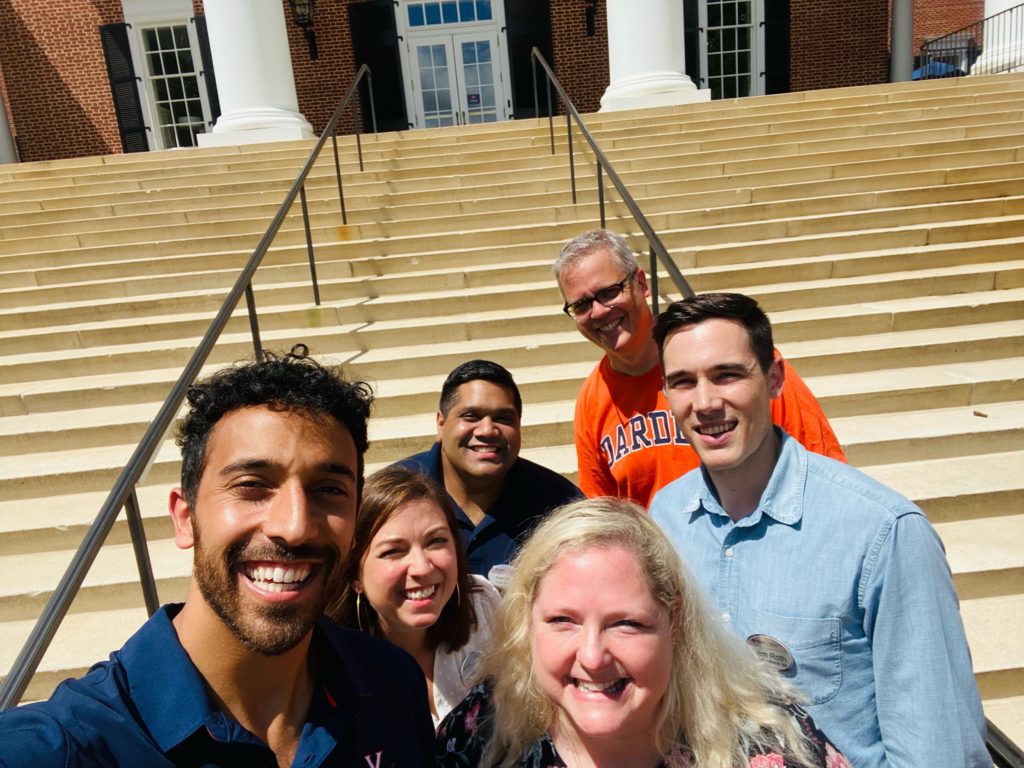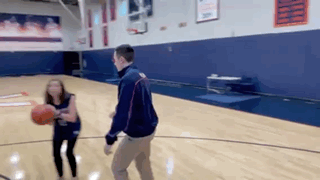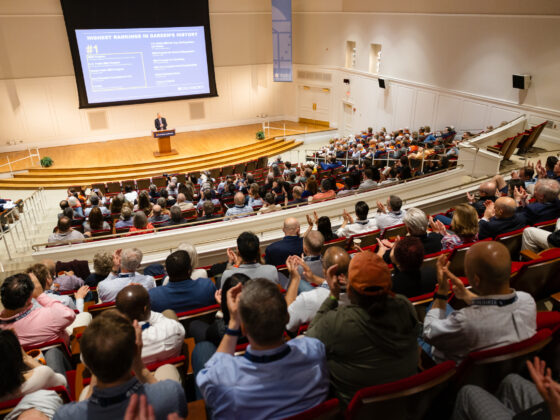Time for a pop quiz!
Complete this definition:
A Darden Learning Team is___________.
- 5 to 6 students from different academic and professional backgrounds assigned to work together
- A support resource for students as they navigate the Darden core curriculum
- A social touchpoint and safety net during students’ earliest days at Darden
- All of the above
If you answered, “D,” you are correct! Darden’s academic experience is designed around a four-step learning model – individual preparation, group preparation, class and reflection. Learning Teams are one of the most important and intentional components in helping students advance beyond their own understanding of a case through group discussion.
Learning Teams are assigned during the summer months (typically by the Office of Student Affairs, often working in consultation with Admissions), and they’re informed by a number of data points, including academic background, professional experience, gender, race/ethnicity, home country, location, personal interests and more.
There’s a secret sauce approach to curating Learning Teams that’s part science and part art. It brings together students from a wide variety of skills and experiences, effectively creating a microcosm of the broader class. Students benefit from an immediate touchpoint and “phone a friend” expertise for almost any topic they encounter during the Darden core curriculum. There are also number of academic support resources available to students beyond their Learning Team – including peer tutors, subject matter experts from class, other Learning Teams, as well as the Darden faculty, just to name a few.
Meet Executive MBA Class of 2023 Learning Team 2!
On The ExecMBA Podcast, we recently caught up Learning Team 2 (LT2) to talk more about the life of a Learning Team, including team norms, how they’ve managed class preparation as well as their advice for future learning teams.
Executive MBA and Part-Time MBA Learning Teams are announced a couple weeks prior to the start of school. Why? Of course, to help you prepare for class. But also because we want to give you an opportunity to connect with your teammates before the rush of the first week-long residency in Charlottesville. This also has the benefit of making the first day of school feel less like, well, the first day of school.
Full-Time MBA Learning Teams are announced during Opening Week. Finding out who your new closest classmates are is truly one of the most anticipated parts of the start of school!

Executive MBA Learning Team 2 shared a few words of wisdom on the recent podcast episode:
It Starts With You.
Successful Learning Teams are not assigned. They are made. As with any group, the success of a Learning Team depends upon the intentions of the participants, and like so many aspects of the Darden experience, you will get out of the Learning Team what you put into it. Catherine Kenney (Class of 2023) noted, “Darden is a very collaborative and encouraging place. If you come to Darden with the expectation that you’re going to be on collaborative, encouraging teams, then it becomes a reality. Come in with an open mind and embrace the culture you want to be a part of. All of us came in with the mindset of, ‘Hey, we’re at Darden. That’s the type of team we want to have.’ And it’s the type of team that we became.”
Organization is Key.
Every Team has its own way of working. Some teams meet in-person. Others connect virtually. Some teams collaborate via a shared document site. Spreadsheets. Teams. OneNote. Zoom. Technology has definitely made all of this easier, but it’s also important for Learning Teams to have honest conversations about learning preference, schedule, goals, and more. As with so many aspects of the Darden experience, it all starts with norms.
Most Executive MBA and Part-Time MBA Learning Teams operate with a fair amount of flexibility, recognizing that occasionally work or life may keep a teammate from being fully present.
“It’s never easy to find time for six people to meet. Everybody has a really busy schedule, so there was a lot of grace if someone couldn’t make a meeting. I think our group was good about absorbing the cases that somebody who missed the team meeting signed up for. There was always somebody that could step in and kind of give a backup summary of the case. And then we always recorded our meetings too. So, if somebody wasn’t there, then they could just watch the recording later.”

It’s a Process.
Where you start is not always where you end up. The way Learning Teams work together will often evolve, particularly over the first couple quarters, as students figure out how to manage work, life and school, as well as what it takes to be prepared for class. With the case method, it can take a while for students to calibrate their class preparation, and of course, each course presents its own challenges.
As shared in the podcast, LT2 met on Sunday evenings for an hour or two during weeks when they had online classes – a decision they made during their first meetings together at the beginning of school. However, as they began working together, they also realized that the Executive MBA schedule created an opportunity for additional engagement. In the week leading up to an in-person weekend residency, the team chose to meet on Tuesday and Thursday evenings, during their typical online class slot, since Executive MBA students have this time free in the lead-up to a residency.
Play to Your Strengths. But Also be Willing to Stretch.
As LT2 member Kuleen Mehta (Class of 2023) shared during the podcast, during their early days as a Learning Team, LT2 members would often focus on those topics that were most familiar. However, at some point, people began taking the lead on topics that came less easily.
“In Quarter 1, we all tried to do everything. I think that’s an intentional learning curve Darden gives you. We realized there was no way we could all get to everything, so we started dividing up the work. At first, we gravitated towards topics we were good at. But at some point, we also started to stretch, and team members would sign up for a quantitative class and a leadership class. And I think that’s where a lot of that learning came in from, because it’s easy to lean into what you already know. But if you want to grow, you’ve got to try out what you don’t know. That’s why we’re here.”
This practice was a direct product of the team’s culture and their attention to creating an intentional atmosphere of psychological safety. This supportive approach is a hallmark of the Darden experience. Mehta also shared, “Going into this process, I wasn’t sure what to expect, and I had some pre-existing notions about business school being a competitive endeavor. Darden could not be further from that. If anything, it’s been the exact opposite! People have been incredibly encouraging and willing to help. Even in a class where we’re graded on a curve, if you’re not getting a concept, someone is willing to help you. That’s especially true of our team, but I do think that it’s true more broadly as well. People want to help you understand the material and have a positive experience.”

Learning is a Team Sport
Lastly, it’s important to remember that every learning team member has something to add, and every team member is at Darden for a reason. At the end of the day, a Learning Team is the sum of its individual members. As John Grant (Class of 2023) commented, “Business school is a team sport. You can’t get through Darden on your own. I can’t express how much I’ve learned from everybody else on my team, which is an intentional part of how Darden teaches these cases. For me, that is a major takeaway from my Darden experience.”





